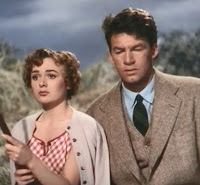 |
| Bill Travers as the adult Geordie. |
That night, he sees a newspaper ad that will change his life. In the advertisement, bodybuilder Henry Samson asks: "Are you undersized? Let me make a different man of you!" Geordie sends off for Samson's exercise program and soon becomes obsessed with physical fitness. He eventually grows into a 6' 6" muscular young man! (As one character notes, the exercises can't have accounted for his growth spurt.)
Unfortunately, Geordie's focus on building his muscles has come with a cost. Jean, now an attractive young woman, feels ignored. The situation doesn't improve when Samson recommends that Geordie take up a sport like hammer throwing--at which he excels. Indeed, his hammer throwing attracts the interest of officials organizing Britain's team for the 1956 Olympics in Melbourne.
 |
| Norah Gorsen as Jean and Travers. |
Indeed, Geordie works best when staying in Scotland and focusing on the Geordie-Jean relationship. One of the best scenes has Geordie floundering in his first hammer throwing competition until he hears Jean calling out to him from a nearby hill. Later, when the plot relocates to Melbourne, it becomes a conventional fish-out-of-water story.
 |
| Alastair Sim as the Laird. |
Upon its release in Great Britain, Geordie quickly became a box office hit. Hollywood took notice of the ruggedly handsome Bill Travers and cast him opposite established stars in movies like Footsteps in the Fog (1955) and The Barretts of Wimpole Street (1957). His biggest success, though, didn't come until 1967 when he appeared with his wife Virginia McKenna in Born Free (1966). That film and Ring of Bright Water (about an otter) transformed the couple into animal rights activists. It was a passion that Travers pursued until his death in 1994.














